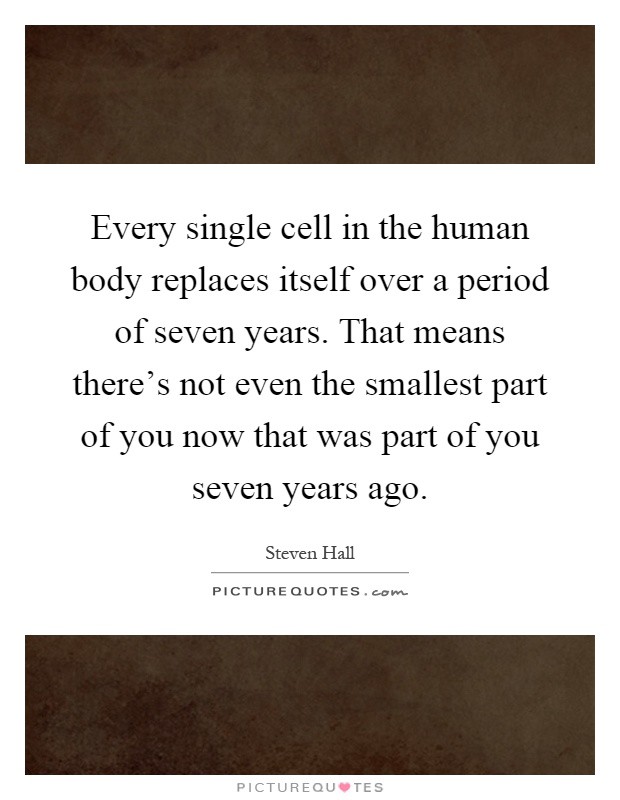Anyone can publish on Medium per our Policies, but we don?t fact-check every story. For more info about the coronavirus, see cdc.gov.
Learn a new fact for the week: how rapidly does our body replace its cells? And if we constantly grow new skin, why do scars never fully vanish?
 ?Sorry, son, that scar is sticking with you for the rest of your life. Also, the doctors are baffled by your blurriness. They?re gonna name the condition after you.? Photo by Cristian Newman.
?Sorry, son, that scar is sticking with you for the rest of your life. Also, the doctors are baffled by your blurriness. They?re gonna name the condition after you.? Photo by Cristian Newman.
It?s a popular factoid, one that I remember hearing from multiple people, ever since I was a child:
?Our cells replace themselves every 7 years.?
 Wow, it?s really inspiring. It?s also totally wrong, but Steven Hall?s a writer, not a scientist, so we can cut him a little slack. Source.
Wow, it?s really inspiring. It?s also totally wrong, but Steven Hall?s a writer, not a scientist, so we can cut him a little slack. Source.
This factoid is often paired with all sorts of inspirational quotes. ?If our cells replace themselves every 7 years, that means that you?re not the same person that you were seven years ago.?
It?s inspiring and uplifting, and we should all strive to improve ourselves ? but if this fact is right, why do I still have a scar on my shoulder from a childhood injury?
Shouldn?t that scar have been replaced with new, fresh skin?
Or do we regrow scars?
The short answer is that this seven-year-replacement factoid is, sadly, incorrect. But we do know our cells regrow and replenish. How long does that take ? and, back to the main point, why don?t our scars ever truly heal?
Your Body Is (Partly) Younger Than You Think
If you?re in your early forties, how old are the cells that make up your body?
One guess might be, well, they?re the same age as you, as a complete person ? they?re about forty-some years old. But this isn?t the case. Your cells are constantly dying, but they?re being replaced with new, fresh cells. This constant turnover is how we heal ? and part of why we develop cancer, when the cell?s DNA instructions aren?t copied properly to the newly created offspring cells.
The famous statistic, ?our body fully replaces itself every seven years,? probably came in part from studies that look at the average age of a cell in humans. Jonas Frisn published a paper in 2005 which showed, based on carbon dating, that the average age of a cell in the human body is between 7 and 10 years.
There?s one word in that sentence which is different from the quote above. Can you spot it?
The average age of a cell is 7 years? but that doesn?t mean that every cell is replaced in 7 years.
Some cells, in fact, never get replaced at all, remaining with us from birth until death. These include many of the neurons in our cerebellum (the part of the brain that controls balance and coordination), and the cells that make up the lenses in our eyes.
Other cells are replaced at varying rates:
- Red blood cells have a lifespan of just 70?120 days.
- Intestinal cells turn over every 10 years or so ? but the epithelial cells (exposed to the inside of the intestine) only last about 5 days, while the other intestinal cells last around 16 years.
- Skeletal muscle cells last around 15 years.
- An average skin cell only lasts about 14 days before dying.
So while the average age of all cells in the human body is about 7 years, this is due to some cells being extremely durable and lasting for many years, while other cells are renewed every few days to few weeks.
?Okay, so the quote above is false. But what about the question? Why do I have scars, especially if skin cells are replaced every 14 days??
Thanks for keeping us on track, rhetorical question asker, who exists only in my imagination! The short answer is that scars aren?t the same as skin.
?You?ve made me more confused.?
 Tattoos are not scars, but they are another item that doesn?t fade from shedding skin ? in their case, they?re injected beneath the dermis, the layer of the skin that sheds. Photo by Antonino Visalli.
Tattoos are not scars, but they are another item that doesn?t fade from shedding skin ? in their case, they?re injected beneath the dermis, the layer of the skin that sheds. Photo by Antonino Visalli.
Sorry. What we think of as scars are usually made of collagen, a stringy protein that makes up much of our structure. About 25% of the total protein in the human body is made of collagen!
Our skin is naturally full of collagen; it?s woven in a linked, somewhat random fashion. It helps keep our skin plump and taut, acting as a glue to hold our skin together.
When we get injured, our body rushes to put a patch over the wound. It uses collagen to create this patch ? but instead of making a nice, woven blanket of collagen, with fibers going in all different directions, it cross-links the collagen fibers so they mostly all point in the same direction.
This lump of cross-linked, same-direction collagen is what we regard as a scar. Because it?s dense, it remains inert, and skin cells grow around it. Even as these skin cells die and are replaced, the scar itself remains.
Over time, however, some of the collagen will be re-absorbed, and the cells grow closer to the remaining collagen. This is why scars fade and diminish over time, although they?ll never fully vanish.
Next time you hear someone state that every cell in our body is replaced every seven years, you can now confidently correct them: the average age of a cell in our body is 7 years, but some cells are replaced constantly, while others stay with us for our entire lives.
Some structures, such as the cross-linked collagen that forms scar tissue, in?t replaced. Cells continue to grow (and be replaced) around it, but it remains ? hence why scars remain for years and years, far longer than the 14-day lifespan of the skin cells around them.
Just like our bones, or the lenses of our eyes, scars remain a part of us long after they?re first formed.
Sam Westreich holds his PhD in genetics, focusing on methods for studying the gut-associated microbiome. He currently works at a bioinformatics-focused startup in Silicon Valley. Follow on Medium, or on Twitter at @swestreich.
Have a science-related question? Comment to suggest a topic for my next story. Or check out this related story:


